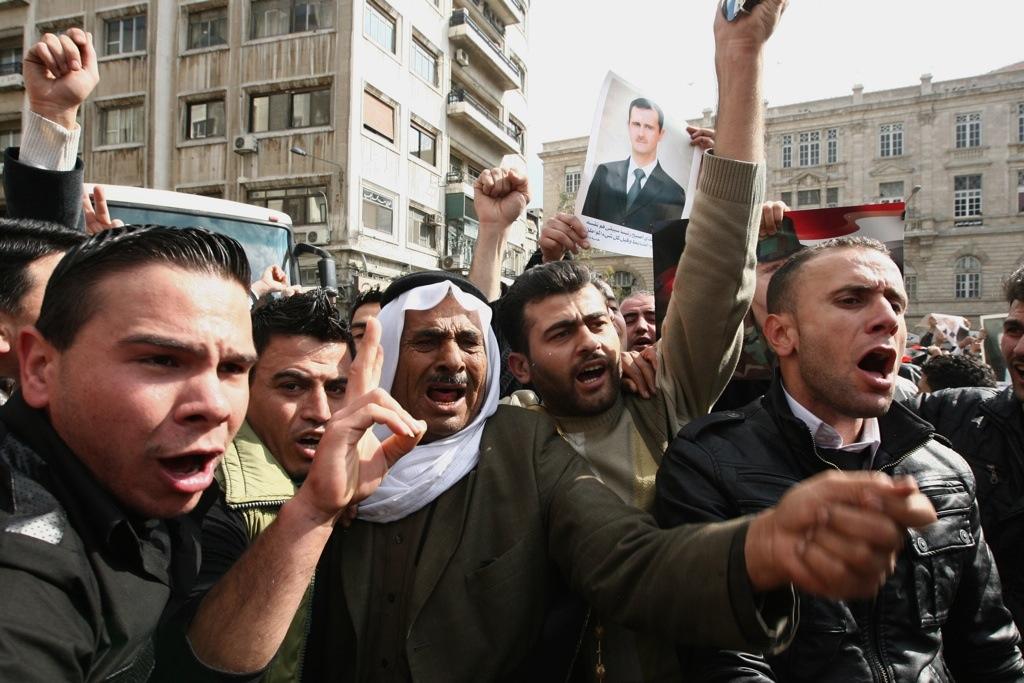Protests and violence sweep through Syria
Syrian protesters in the Old City of Damascus on March 25, 2011.
DAMASCUS, Syria — Although the Syrian government announced that it would begin political reforms, its widespread use of violence against protesters in recent days indicates the regime here is more likely to follow the repressive path of Libya, Bahrain and Yemen than the path of Egypt or Tunisia.
Security forces arrested about 200 people in a midnight raid, the AP reported Saturday. Activists said up to 4,000 people were demonstrating in Duoma, outside of the capital Damascus, when electricity was cut and security forces stormed the protest.
There were unverified reports that 23 people had been killed earlier on Friday, at protests across the country. Hundreds were protesting in Homs, Hama, Tel and Latakia and in towns surrounding Deraa, and there were smaller protests in the major cities of Damascus and Aleppo.
In the southern city of Deraa, the demonstrators had taken to the streets Friday as part of a funeral march for protesters killed that week by police gunfire. Amnesty International estimates that at least 55 week have died the last week in Deraa, the site of the country’s largest and most deadly protests so far.
Protests began last week after children were arrested for writing slogans against the Syrian president. Security forces cracked down violently on the demonstrations, according to human rights activists, leading to more protests, where forces opened fire.
Some Syrians had hoped the recent raft of announced measures — new food and fuel subsidies, public salary increases, reductions in obligatory military service — might mean that the Baath party would follow a more peaceful route to appease the demonstrators.
But the violence in the last several days has killed such hopes, one Syrian journalist said.
The government’s maneuvers have so far been marked by contradictions. While it declared Wednesday plans for major reforms, including “a study” about the need for a long-running emergency law that has led to the imprisonment of thousands of political opponents without trial, the regime is simultaneously meeting protesters with brutal violence, arresting dissidents, and denying journalists entry into troubled areas.
On Wednesday the government said it would ease restriction on the media, then proceeded to crack down on press freedom throughout the country.
Press freedom here is notoriously limited. Syria ranks in the bottom 10 of the Press Freedom Index along with North Korea, Myanmar, China and Iran.
Buthaina Shaaban, an adviser to president Bashar al-Assad, said this week that only “Syrian television tells the truth,” and that foreign media should stop spreading lies about the country.
Armed guards have turned back foreign and Syrian reporters attempting to enter Deraa. Several foreign journalists have been ushered out of the country and numerous Syrian journalists have disappeared since the protests first began in earnest earlier this week.
Sources in Damascus said the use of violence by security forces would likely only inflame public anger and attract more anti-government demonstrators, a trend that has proven true over and over again as revolution sweeps the Middle East and North Africa.
“In 1925 the French chose massive force,” said Michael Provence, a Middle East expert at the University of California San Diego, adding that continued violence will lead to greater instability. “In the 1980s, the [Syrian] government responded similarly. Extreme brutality leads to de-legitimization of the state elites.”
The Syrian regime, meanwhile, is sticking to its propaganda playbook.
Friday in Damascus, parades filled the city’s main streets. Men hung from cars and trucks, waving flags and banners in support of the president. They chanted “Allah, Syria, Bashar — that’s all!”
While some might genuinely be motivated by personal conviction — the president is quite popular in Damascus, while the regime suffers the brunt of the criticism — others are part of the estimated one-million-strong secret police who are paid a small stipend to report on their friends and neighbors and to stage regular, “spontaneous,” pro-government demonstrations.
People attempting to demonstrate against the government in the center of the city were quickly dispersed. A man who, according to an eyewitness, shouted “freedom” during Friday prayers at the Umayyad Mosque was quickly accosted and whisked away in an unmarked car.
The events in Syria are part of a sea change in the Arab world. And this sea change appears to no longer exist solely among countries that are aligned with Western nations. Instead, it seems, all governments that rule through a culture of fear now have something to fear themselves.
“2011 is going to prove one of those decisive dates in the modern history of the Arabs,” Eugene Rogan, a Middle East history professor at Oxford University, said. “Autocratic rule will not disappear in 2011, but it is the beginning of the end.”
Every day, reporters and producers at The World are hard at work bringing you human-centered news from across the globe. But we can’t do it without you. We need your support to ensure we can continue this work for another year.
Make a gift today, and you’ll help us unlock a matching gift of $67,000!
